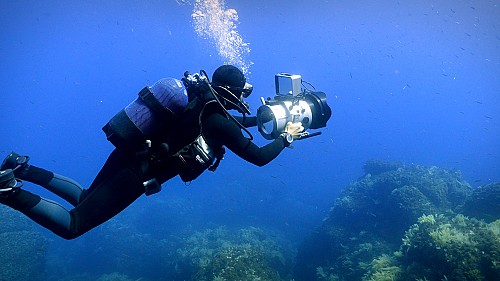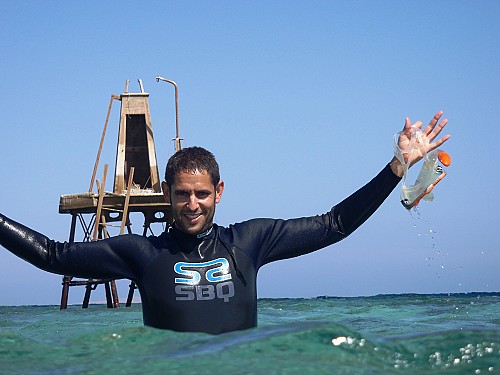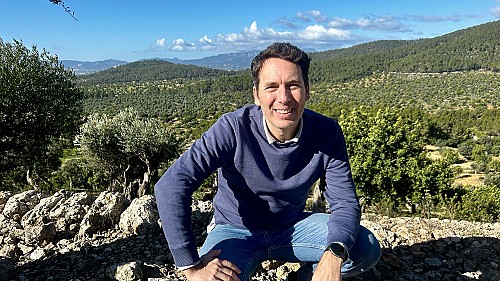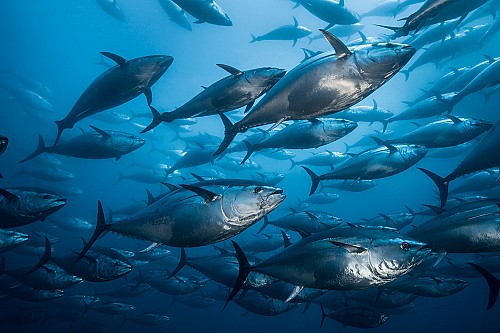Marga Font: 'Arxipèlag Blau' (Blue Archipelago) is a unique series that raises awareness among several generations about the importance of protecting the sea.
Published 04.05.2023
Share
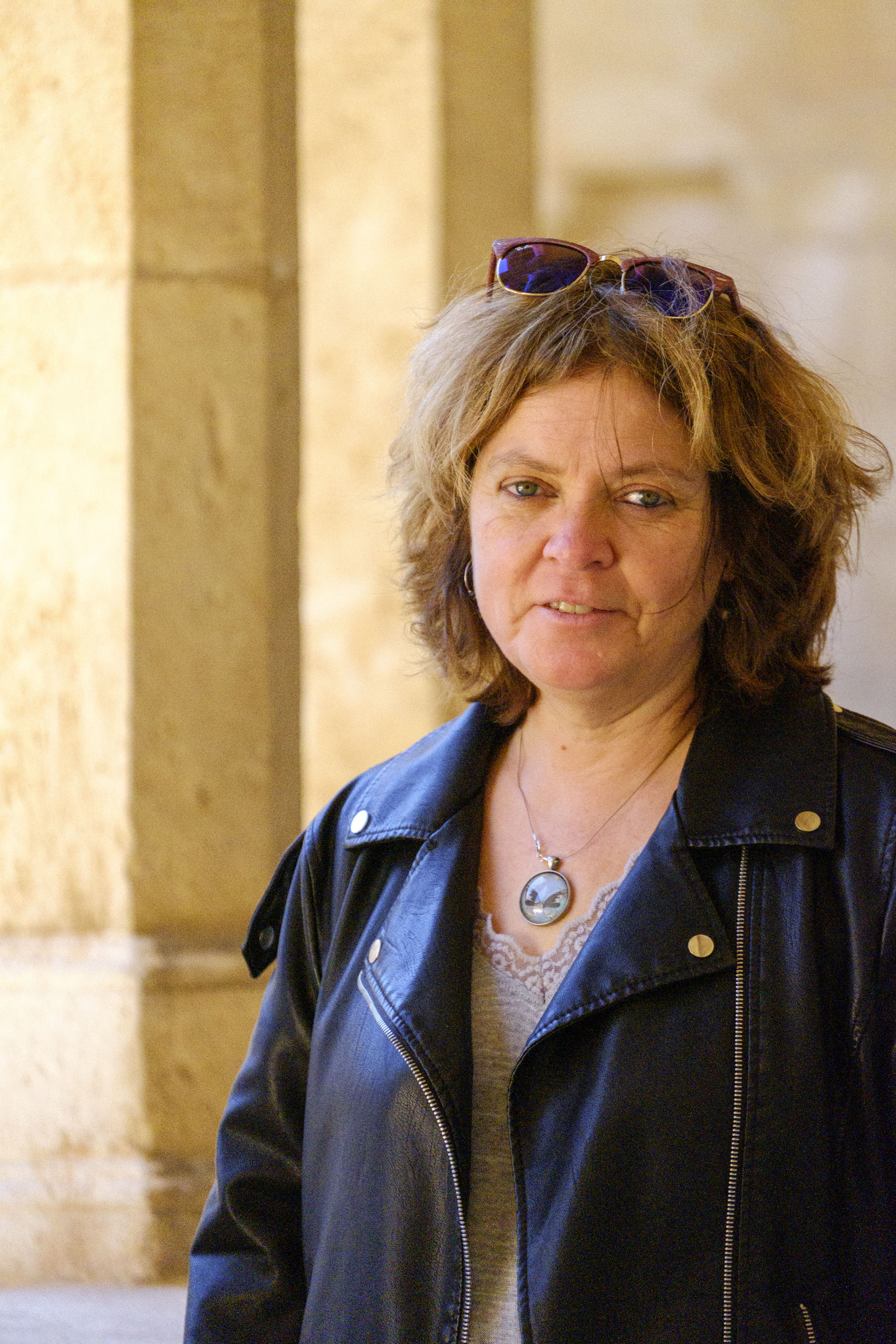
Related project
Originally from Cornellà de Llobregat, Marga Font has lived in Mallorca for more than 25 years. She came to work for Greenpeace and, falling in love with the island and the people who live here, she stayed. Today, she works as a freelance journalist and, among other jobs and projects, she writes scripts for IB3 series, such as Passejades (Walks) and A Muntanya (A Mountain). In her own words: ‘I have had the good fortune - as immense as the sea - to collaborate on the script for Archipiélago Azul, as part of a very large team." She is passionate about working on themes linked to nature, the territory, and the heritage of the Islands. She gives her all and feels at ease here.
ARXIPÈLAG BLAU HAS BEEN IB3'S MOST SUCCESSFUL PREMIERE THIS YEAR. DID YOU EXPECT THIS RECEPTION?
It is extraordinary news in many ways. Firstly, because the effort invested in the series was enormous: almost three years of intense work and enthusiasm from a great team, great both in the sense of fabulous and in terms of the number of people involved. Behind each image, there are hours, days, or weeks of planning and work and, above all, patience and waiting on the part of the underwater cameramen. And secondly, because the sea is extremely beautiful and vital for the survival of many species, including our own. Knowing how to transmit this emergency – the need to protect our seas - and this beauty were great objectives that have been achieved. That there is interest, that viewers are left speechless with admiration for the biodiversity and the incredible adaptation of species to the diverse habitats of the Balearic Sea, that they feel fortunate to live surrounded by such a beautiful and fragile treasure, this can make us all look at the sea with more respect and become actively involved in its conservation.
SCIENTISTS AND JOURNALISTS DO NOT ALWAYS SPEAK THE SAME LANGUAGE. IS THE PROCESS OF CONSTRUCTING AN AUDIOVISUAL PRODUCT THAT IS RIGOROUS AND AT THE SAME TIME ATTRACTIVE AND UNDERSTANDABLE DIFFICULT? HOW IS IT ACHIEVED?
It is about teamwork and mutual listening. I have no knowledge of biology, but I do have knowledge of communication, and I can help transmit content to empathise with the public: being rigorous with the scientific truth, avoiding words that only experts know, and explaining complex topics plainly and attractively. This is outreach. In a popular science programme, every word that is 'strange' or not very understandable for the general public can become a stone in the viewer's shoe, disconnnecting them from the content as they try to guess the meaning. During the scripting process of Archipiélago Azul, the scientific director, Xisco Riera, ensured the rigour of the content. The scriptwriters converted this rigour into attractive and comprehensible information and ensured we told a story - as long as the images allowed. This ancient form of communication has helped us to empathise with others and with the environment since the beginning of time. The life of marine species is full of stories of survival, tenderness, and sacrifice, and just plain fun. Working on this series, we have all learned a lot from each other.
IN THE BALEARIC ISLANDS THERE WAS NO DOCUMENTATION OF THE SEABED LIKE THE ONE THAT ARXIPÈLAG BLAU NOW SHOWS US. WAS IT OVERDUE?
There is a lot of information and documentation. In the Balearics, there are underwater cameras with a huge archive, accumulated over years of diving. But all this has never been brought together in a documentary series with a rigorous and informative spirit. Furthermore, in Arxipèlag blau there are images that have never been seen before or that have been filmed for the first time in the islands. Some of them come from the extraordinary archive of Fernando Garfella. But the fact is that nobody until now had had the idea, the courage, and the resources to take on a project like this. Many elements have come together to make it possible. Carmelo Sirera and Xisco Riera had the original idea and were committed to the process; IB3 and Marilles Foundation provided resources and unconditional support for the project; and Miraprim production company, with Diego Villalonga as director, gave its skin and soul to make it a reality. Thanks, too, to the collaboration of many people who provided images or worked from invisible positions: the camera team, the editing and sound team, the post-production team, the music... All this has made Arxipèlag blau a unique series, a milestone for local television, which will make several generations aware of the importance of protecting the sea.
HAD YOU BEEN INVOLVED IN POPULAR SCIENCE BEFORE?
I began my work as a journalist for Integral magazine in the 1990s. Since then, I have collaborated and continue to collaborate with publications where there is always dissemination involved. I believe that every journalist is a populariser; we are people who tend to be obsessed with communication, with using clear sentences that directly transmit an idea that is sometimes complex. Dissemination is basically asking and trying to answer the kind of questions that children ask, which are very direct and sometimes annoying, born out of curiosity and absolute fascination.
DO YOU THINK THIS KIND OF DISSEMINATION IS NECESSARY?
It is essential. Even more so at the point where we are, when the effects of climate change are daily and probably unstoppable. The impact of humans as a species is enormous. That's why we need to clearly and urgently transmit the information that scientists have known for decades, because if we are not aware of our impact we will not feel the need to change. And when we know the information and understand the reality, we can put pressure on politicians much more effectively and forcefully. Arxipèlag blau, as an outreach series, has this potential because at the same time, it is a warning: all the beauty and biodiversity of the sea may soon disappear if we do nothing to prevent it from happening. Investing in marine conservation translates into more wealth, more beauty, and more future.
WHAT HAVE YOU LEARNED FROM THE PROCESS OF CREATING ARXIPÈLAG BLAU?
Patience, because it is a long-term project; empathy with the team to understand the tone and spirit of the programme; and humility, because within such a big team I was a very small piece at the service of the others. I learned to put writing at the service of the common goal of making the sea known with rigour as a banner. Also, in a programme like this, the script has to be written at the end of the process, with the images that have been obtained of each habitat. We had to find marine information from reliable sources, such as the Balearic Sea Report.
HAS PARTICIPATING IN THIS DOCUMENTARY CHANGED YOUR VISION OF THE SEA?
I have always had a close relationship with the sea. I sail often. I see paths, no borders. I have never lived far from the sea. But the series has enriched my viewpoint. Now when I put on my mask and the snorkel, I see habitats and not just rocks, Posidonia, or sand. I know what I can expect to see and where. I know the names of some species. It is a way of knowing, I know, but it increases the love I feel for the sea and also the sense of urgency: We have to make profound changes now to protect it and demand from the powers that be that this is a non-negotiable priority objective.
WHAT DO YOU THINK IS THE RELATIONSHIP BETWEEN THE ISLANDERS AND THE SEA?
I have learned a lot from the people of the Islands about the sea. I think they have a natural, everyday relationship with it. Many professions are linked and everyone knows how to enjoy the sea. The sea is omnipresent in legends, novels, films, and personal anecdotes. I am surprised by the number of different names for each marine species or the place names that fishers gave to each corner of the coast. But what was once a more or less balanced relationship has become unbalanced as a result of mass tourism. This impact has a price for on the territory and for the sea. We have to rethink the tourism model and learn to make a living by conserving nature.
QUICK TEST FOR SEA LOVERS
A book: During the Arxipèlag blau adventure I was always accompanied by Marine Wildlife of the Mediterranean by Enric Ballesteros and Toni Llobet.
An image that evokes the Balearics: A cormorant drying its feathers on a rock.
A marine species: The octopus, a fabulous animal that has inspired a lot of fiction and even a song by The Beatles.
A person or organisation of reference: David Attenborough and Marilles Foundation.
A beach: Es Carbó, with Cabrera in sight.
Optimistic, realistic or pessimistic? Optimistic, out of desperation.

